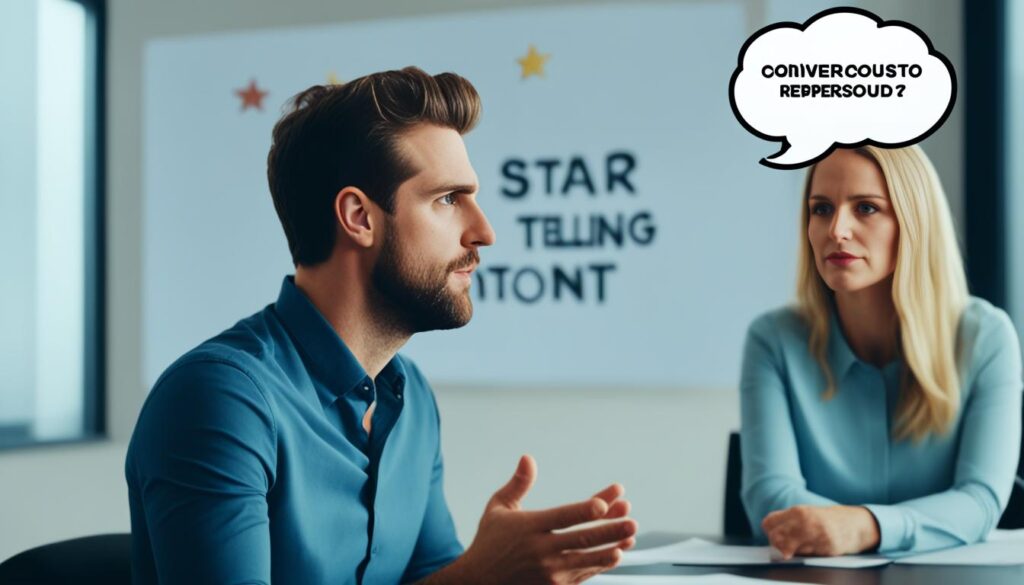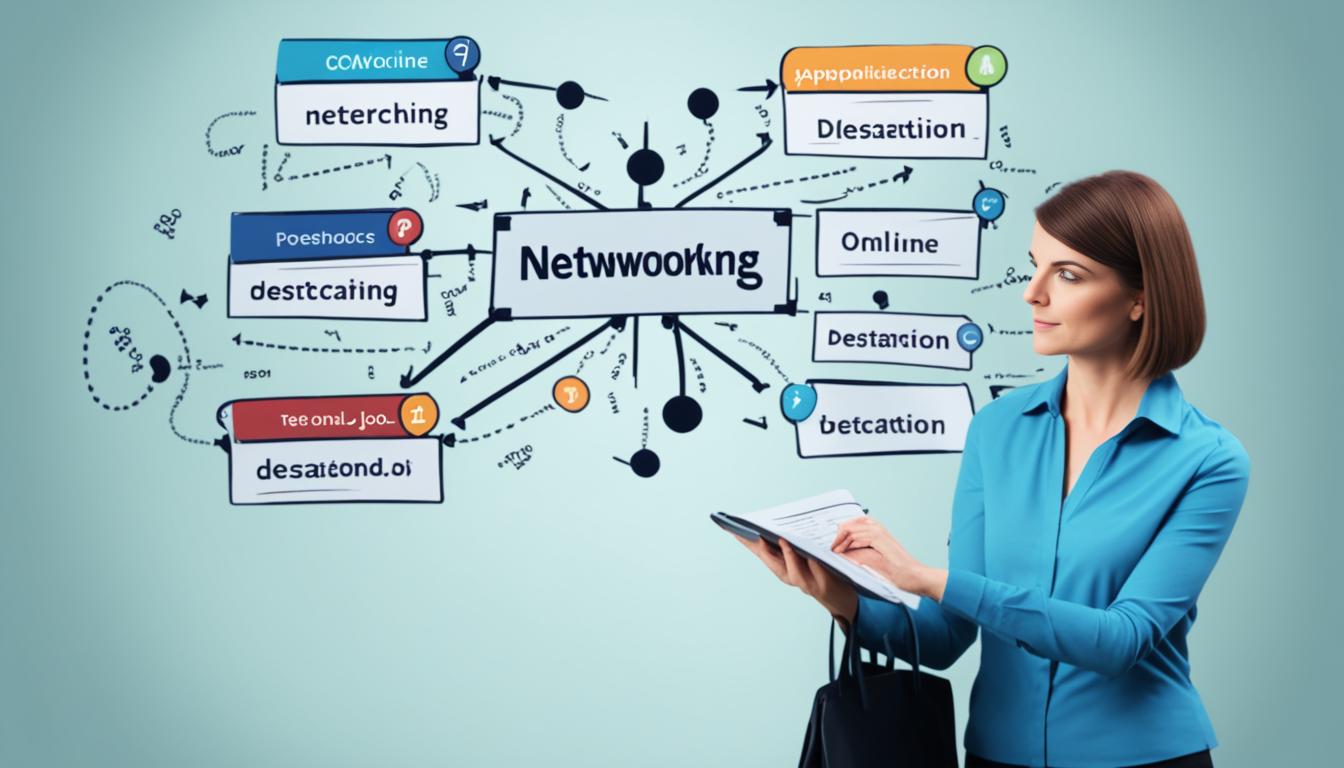Have you ever wondered why some people shine in job interviews and others don’t? Job interviews mix skills, experiences, and personality. This mix forms a lasting impression on potential employers. Mastering interviews needs more than listing qualifications.
It means showing who you are, how you talk, and preparing well. Both new grads and experts can stand out. They use clear talks, listen well, and use the STAR method for questions. To win at interviews, you need skills and the knack to show them. This comes with practice and knowing the interview process well.
Importance of Preparation in Job Interviews
Getting ready for an interview is key to feeling confident. Studies show that 70% of doing well in interviews comes from being prepared. This means learning a lot about the company and the job. Knowing these facts shows you’re really interested. It also helps you answer questions well.
Even though many people feel nervous before their interview, being well-prepared can help calm those nerves. It’s important to know what the company is like and fit your answers to their values. This helps you stand out and get closer to getting the job. Since 80% of interviews ask about your skills, you should talk about your relevant skills and experiences.
Getting ready also means practicing answers to common questions. This practice helps you feel more sure of yourself. You should plan to get there 5-10 minutes early, but not too early. Dressing the part is also crucial, as 65% of employers expect it.
At the end of the interview, be ready to ask your own questions. About 63% of interviewers look forward to this. It shows you’re really interested in the job. Good interview prep sets the stage for a winning job application, matching your answers with what the company wants.
Creating a Positive First Impression

Making a good first impression is key in a job interview. Wearing the right clothes and showing up on time are important. Visiting this site can give you great tips. Getting there 10-15 minutes early shows you are reliable and ready.
Standing or sitting straight shows you’re confident. A firm handshake and looking people in the eye help too. Make sure your clothes are clean and neat to look your best.
First impressions aren’t just how you look. They come from how you connect, too. Starting with small talk makes things friendly. This shows you are good with people, which jobs often need.
Being there early shows you’re on time and lets you get ready. For online interviews, make sure your tech works and there are no distractions. Sending a thank-you note after shows you really want the job.
Effective Communication During the Interview
Good talk during an interview is key. It makes for a great back-and-forth between you and them. Stick to giving clear and concise responses. This way, you best share what you can do. Confident speaking means a few main things:
- Active Listening: Really hear the question before you answer.
- Clarity and Focus: Skip the big words and stick to what matters for the job.
- Steady Pace and Direct Communication: Keep a calm, clear pace when you talk.
Work on common interview questions to keep your answers right on track. Make your answers fit what the job asks. Showing you get what they need is smart. Looking them in the eye while you talk also shows you mean what you say.
Being sure when you talk helps you show off your skills. It makes you look good for the job. The way you reply shows not just your smarts but also that you can share big ideas in easy ways.
Using the STAR Method for Behavioral Questions

The STAR method is perfect for answering behavioral interview questions. It uses a simple structure. This helps you share specific examples of your work and successes.
With the STAR method, you break your answer into four parts. These parts help explain your skills and experiences. That makes it easy for interviewers to understand your value.
- Situation: Describe the context or challenge faced.
- Task: Explain the responsibilities involved or goals set.
- Action: Detail the steps taken to address the situation.
- Result: Share the outcomes or achievements resulting from the actions.
Getting ready is important when using the STAR method. Think of stories that show how you solve problems. These stories should also show how you can adapt. This way of answering makes you look very organized. So, you leave a strong impression in interviews.
Job Interview Techniques
Getting good at job interviews helps a lot in getting a job. It includes preparing well, showing yourself in the best light, and talking confidently. Being early, about 15 minutes, for your interview shows you’re reliable. This is key to make a great first impression.
It’s smart to prepare for often asked interview questions. Questions like “Tell me about yourself” or “What are your strengths and weaknesses.” You can answer clearly and confidently. The STAR method—Situation, Task, Action, Result—helps make your answers better. It shows your past wins well. For instance, telling how you grew social media or got more followers is impressive.
Asking good questions at the end of your interview is important for getting the job. It shows you really care about the job and the company. Asking about what you’ll do or where the company is going is smart. It makes you stand out.
Keeping a balance between being confident and humble is key. You need to make eye contact and stand open. But don’t seem too proud. Show what you can do but be nice and easy to talk to.
Using these interview tips the right way and learning from feedback is helpful. No matter if you’re just starting out or have lots of experience. These tips make you look well-prepared and skilled. This helps in getting the job you want.
Showcasing Cultural Fit and Adaptability
When being interviewed for a job, it’s key to show you’re a great cultural fit and can adapt. Start with good research on the company. Learn about what they value and how they work. This lets you shape your answers to show you fit right in.
Talk about times you worked well in teams. Share how you’ve lived by company values in the past. Point out how those moments prove you’ll blend into the new place smoothly.
Telling stories about when you adapted well is important too. Mention times you handled sudden changes or challenges while keeping a positive attitude. This shows you’re not only flexible but also strong and can do well in various situations.
Asking smart questions about the company culture is part of a good interview strategy. It shows you really care. It also lets you link your past experiences to their setup. This demonstrates you’re a perfect match and ready to join their unique culture.
Addressing Challenging Questions
Getting ready for tough interview questions is key. Turn any weaknesses into growth stories. This keeps things positive.
Think about your interview strategy. Plan how to tackle hard questions. Using the STAR method to share past challenges shows how you solve problems.
- Identify potential gaps or weaknesses in your background.
- Prepare stories that demonstrate learning and growth.
- Practice delivering these stories clearly.
Being open to feedback matters a lot. It shows you’re humble and eager to grow. A thoughtful strategy gets you ready to face interview questions with ease and confidence.
Post-Interview Follow-Up
Getting the job often depends on interview success and a timely interview follow-up. About 80% of successful interviews involve a follow-up email sent within a day. This shows professionalism and strong interest in the job.
When following up after an interview, being specific and thoughtful is key. Mentioning important points from the interview shows you were paying attention. Also, a handwritten note can really make you stand out.
It’s surprising, but only 40% of candidates follow up if a deadline is missed. Sending an email if your availability changes is smart; yet, only 25% do it. This keeps the conversation going and shows you’re flexible.
Also, candidates who ask for feedback increase their chances by up to 30%. This proactive step shows a willingness to improve. It also helps maintain a connection with potential employers, boosting interview success.
Continuous Improvement Through Reflection
Reflecting after an interview helps candidates spot what they did well and what needs work. Writing down thoughts, questions, and answers helps see what’s strong and what’s not. This way, job seekers can do better next time, helping them grow in their careers.
Thinking about your interview is good for growth. Right after, write down the good parts and the tough ones. Ask yourself: Did I show my skills well? Did I make a good impression? How did I handle tricky questions? This thinking helps get better at interviewing.
Using what you learn from interviews helps a lot. Looking back at your notes can show trends. It helps you get better at interviewing over time. This kind of growth means you can adapt and excel, moving up in your career. By knowing your strong points and weaknesses, you’ll stand out in job hunts.

